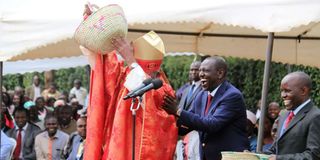Clergy should go easy on political money

John Cardinal Njue (face partly hidden) lifts a Sh2 million cash donation from Deputy President William Ruto during a fundraiser in aid of St Thomas Moore, Kairuri Catholic Parish on July 1, 2018.
What you need to know:
- Sure, we’ve seen Catholic parishes fall prey to the same seductive lure of moneyed politicos who don’t even pretend they are coming to church to pray.
- Local bishops must also approve invitations to politicians for high-profile church functions.
I am not much of a faith guy, though my upbringing and schooling were, like many people’s, quite Christian, in my case through the Catholic Church. Our paths – mine and the Church’s – still cross occasionally in various ways: at weddings, funerals and other events. Whatever you may think of their rituals, I retain respect for the Catholic preference for conducting their secular affairs in a measured, dignified manner.
I bring this up because of the crass infiltration we see these days of places of worship by politicians. The common entry point is through fundraisers. The purpose is to conduct political campaigns. These are no longer done covertly. They are carried out quite brazenly.
Sure, we’ve seen Catholic parishes fall prey to the same seductive lure of moneyed politicos who don’t even pretend they are coming to church to pray. I cringe. Still, there are ground rules the Catholics lay down to ensure they are in control of the proceedings.
To start with, no political speeches until Mass is concluded. Local bishops must also approve invitations to politicians for high-profile church functions. This curbs any tendency by a parish priest to hobnob with any Mike Sonko or Oscar Sudi he fancies.
Gain mileage
By and large, the Catholic church’s mainstream brethren in Kenya – denominations like the Anglicans, the Presbyterians and certain others – have defined ground rules, too. Their clergy must remain non-partisan and show it by word, especially when at the pulpit. Whether the clergy adhere to these rules is another matter. In many cases, they don’t. Hence the relative ease with which political figures entwine themselves around the churches to gain mileage.
In all these cases, the clergy’s motivation is money. They have a healthier appetite for banknotes than for the Gospel they preach.
This problem is far worse in the evangelical (or is it pentecostal?) outfits. Not all of them, to be sure. There are many that are strait-laced and keep the politicians seeking to use them at arm’s length. But there are other less respectable ones whose leaders are just a bunch of greedy charlatans.
They will even allow the politician guest-of-honour, and his entourage, to make their political pitch from the pulpit.
The pastors will go as far as tailoring the sermon of the day to the politician’s taste. These are not churches any more but marketplaces. The Gospel of Matthew 21:13 says it all.
I’ll give it to the Muslims: they don’t allow these kind of shenanigans by politicians in mosques.
As in many things, the churches have discretion on who to invite to grace their functions. This discretion is important because politicians, when left to themselves, have a very poor sense of distinguishing which events would be inappropriate for them to attend or where their presence would cause tension. They would just be gate-crashing every house-warming event in sight.
It is, therefore, up to the church leaders to exercise prudence when extending invitations for their fundraisers. Let’s not forget that the politicians don’t just invite themselves to these functions. They get invited by the church leaders.
Here is an example all churches should emulate. Sometime in October last year, the Kenya Conference of Catholic Bishops drew up new rules to govern fundraisers organised by Catholic churches. They were responding to a national outcry that some sleazy political leaders were using church fundraisers to sanitise money acquired through corruption.
Henceforth, the bishops decreed, contributions would be channelled through mobile money transfers, or by cheque. This would avoid the handling of large amounts of cash. But more importantly, it would leave a clear trail of the donors.
The second requirement was that any gift to a religious leader of the church should be accompanied by an acknowledgement letter from the donor. Records would also be kept of all gifts exceeding Sh50,000. The gifts would be acknowledged by a replying letter.
Next, lists and accounts of all fundraising initiatives and projects being undertaken by the church would be kept open for public scrutiny.
Political speeches
One particularly relevant directive was the banning of political speeches inside churches and at Catholic Church-officiated funerals. No addresses of a non-liturgical nature were to be allowed within the church confines. Such speeches would be made only outside the church sanctuary.
Finally, a corruption complaints desk would be opened at the diocesan offices where the public is welcome to report such complaints.
The measures were to run for six months initially. I don’t know whether that period was extended. If not, they should. What I do remember was the Director of Public Prosecutions and the Directorate of Criminal Investigations, who were in the thick of investigating major corruption cases, profusely thanking the Catholic Church for this initiative.
The other churches should clean up their act. They can leave the politicians to do their roadshows. Just don't allow them to pollute your sacred spaces.





